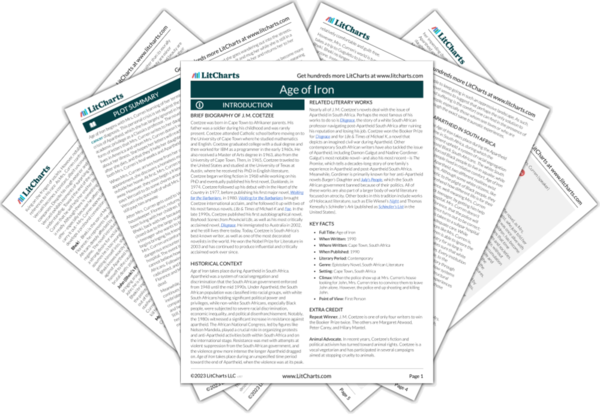Bheki Quotes in Age of Iron
“They work with the police,” said Bheki. “They are all, the same, the ambulances, the doctors, the police.”
“That is nonsense,” I said.
“Nobody trusts the ambulance any more. They are always talking to the police on their radios.”
“Nonsense.”
He smiled a smile not without charm, relishing this chance to lecture me, to tell me about real life. I, the old woman who lived in a shoe, who had no children and didn't know what to do. “It is true,” he said—“listen and you will hear.”
The inside of the hall was a mess of rubble and charred beams. Against the far wall, shielded from the worst of the rain, were five bodies neatly laid out. The body in the middle was that of Florence’s Bheki. He still wore the grey flannel trousers, white shirt and maroon pullover of his school, but his feet were bare. His eyes were open and staring, his mouth open too. The rain had been beating on him for hours, on him and his comrades, not only here but wherever they had been when they met their deaths; their clothes, their very hair, had a flattened, dead look. In the corners of his eyes there were grains of sand. There was sand in his mouth.
I tell you the story of this morning mindful that the storyteller, from her office, claims the place of right. It is through my eyes that you see; the voice that speaks in your head is mine. Through me alone do you find yourself here on these desolate flats, smell the smoke in the air, see the bodies of the dead, hear the weeping, shiver in the rain. It is my thoughts that you think, my despair that you feel, and also the first stirrings of welcome for whatever will put an end to thought: sleep, death. To me your sympathies flow; your heart beats with mine.
What did I want? What did the old lady want? What she wanted was to bare something to them, whatever there was that might be bared at this time, in this place. What she wanted, before they got rid of her, was to bring out a scar, a hurt, to force it upon them, to make them see it with their own eyes: a scar, any scar, the scar of all this suffering, but in the end my scar, since our own scars are the only scars we can carry with us.

Bheki Quotes in Age of Iron
“They work with the police,” said Bheki. “They are all, the same, the ambulances, the doctors, the police.”
“That is nonsense,” I said.
“Nobody trusts the ambulance any more. They are always talking to the police on their radios.”
“Nonsense.”
He smiled a smile not without charm, relishing this chance to lecture me, to tell me about real life. I, the old woman who lived in a shoe, who had no children and didn't know what to do. “It is true,” he said—“listen and you will hear.”
The inside of the hall was a mess of rubble and charred beams. Against the far wall, shielded from the worst of the rain, were five bodies neatly laid out. The body in the middle was that of Florence’s Bheki. He still wore the grey flannel trousers, white shirt and maroon pullover of his school, but his feet were bare. His eyes were open and staring, his mouth open too. The rain had been beating on him for hours, on him and his comrades, not only here but wherever they had been when they met their deaths; their clothes, their very hair, had a flattened, dead look. In the corners of his eyes there were grains of sand. There was sand in his mouth.
I tell you the story of this morning mindful that the storyteller, from her office, claims the place of right. It is through my eyes that you see; the voice that speaks in your head is mine. Through me alone do you find yourself here on these desolate flats, smell the smoke in the air, see the bodies of the dead, hear the weeping, shiver in the rain. It is my thoughts that you think, my despair that you feel, and also the first stirrings of welcome for whatever will put an end to thought: sleep, death. To me your sympathies flow; your heart beats with mine.
What did I want? What did the old lady want? What she wanted was to bare something to them, whatever there was that might be bared at this time, in this place. What she wanted, before they got rid of her, was to bring out a scar, a hurt, to force it upon them, to make them see it with their own eyes: a scar, any scar, the scar of all this suffering, but in the end my scar, since our own scars are the only scars we can carry with us.











